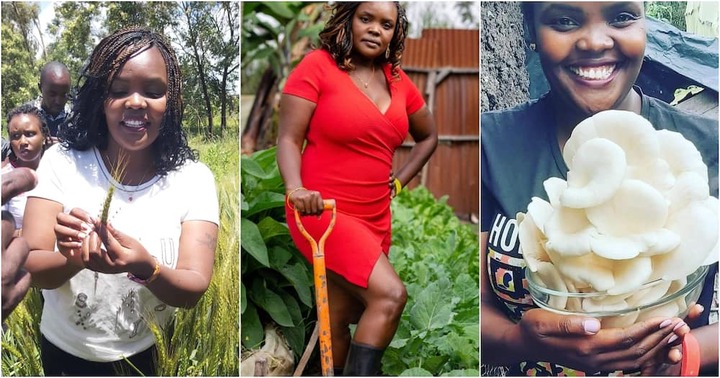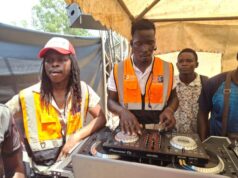Wangari Kuria, a 30-year-old Nyahururu farmer and trainer, lost her job, but it resulted in new opportunities for her, allowing her to pursue her love for farming.
She completed a Master’s Degree in Business Administration-Strategic Management at the United States International University (USIU). Strangely, she did not study agriculture since she had never imagined herself doing it professionally.
Formal Employment versus Farming
Earlier, she was overjoyed to secure a desk job as an estate manager. Things were starting to look well for her, and she was promoted to project manager. She had enrolled in a master’s degree that was related to her profession at the time, only for everything to go apart when the firm she was serving collapsed.
She ventured into small-scale production of green vegetables, mushrooms, strawberries, and rabbit meat before the onset of the pandemic, and big-scale cultivation of garlic. She had begun farming as a side business while working full-time in real estate and had amazing beginner’s luck, earning KES 66,000 from English cucumbers.
Her previous agricultural expertise was confined to witnessing her wonderful mother, who grew potatoes for their family and relatives.
With a budget of KSh 30,000, she was able to start to produce sukuma wiki and spinach, which would allow her to meet my basic requirements while also saving at least KSh 20,000 each month until she reached adulthood.
The enterprise was successful since many Kenyans used to spend between KSh 80 and KSh 100 per day on veggies.
Diversification
In 2019, she brought rabbits and learned how to cultivate mushrooms, which she founded and eventually integrated into her project.
It was then that she realized that farming might be a full-time, well-paying career if done well, with knowledge, devotion, and adoption of new technology, and she invested all of her efforts and brainpower into it, learning a lot as time went on.
She started bringing food baskets to her church, Mavuno, weekly, and she had a regular market from her Kitengela neighbours through their numerous Nyumba Kumi WhatsApp groups.
Thanks to the rapid use of digital technologies and social media platforms, the business expanded by more than 200 per cent.
Power of Social media
Her survival has been through social media and digital technologies. What started as movies for her friends who wanted to emulate her kitchen garden in their backyards has turned into a staple for her, with 4300 YouTube subscribers and counting. Thanks to Facebook, Twitter, YouTube, and WhatsApp groups, this is all possible.
Her progress in agribusiness has been gradual and mostly based on trial and error. The introduction of the M-Pesa till Number by Safaricom has aided her in separating her agricultural revenue from her accounts.
As she continues on my journey as an Influencer, she has first-hand experience of how powerful digital tools can be in empowering young women like herself. In agribusiness, there is still a big gap when it comes to financial access for women who wish to contribute to any part of the value chain and financial literacy in general.
Engagement of Public
Kuria is dedicated to teaching and inspiring aspiring farmers about excellent agricultural methods via her Youtube channel with the link.
https://www.youtube.com/channel/UCdqRck5IInzXLUqRT6Fuh1g
She is currently the CEO of Farmer on Fire, Global Consultancy, an organization dedicated to eradicating hunger and improving food safety. Through the adventure, she has broadened her experience as a farmer, aggregator, and market value chain specialist.
At the moment, she is working hard to make agriculture more accessible to the general public by generating entertaining films on agricultural approaches and techniques and encouraging internet platform users to support the enterprise that can ensure her country’s food availability.







